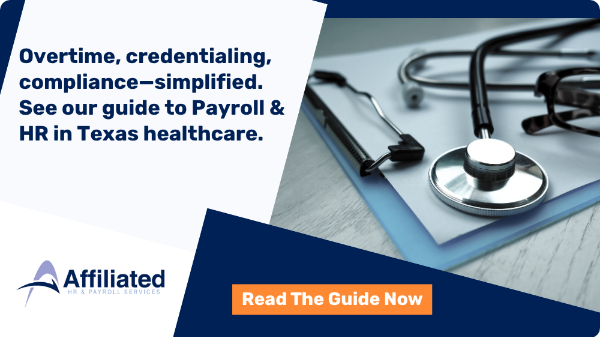Running a healthcare facility in Texas requires more than providing quality patient care; it also means maintaining strict compliance with payroll and labor regulations. From managing on-call pay and overtime to understanding when a final paycheck must be issued, healthcare employers face some complex wage and hour requirements.
In an industry where long shifts and multiple pay classifications are the norm, even small payroll errors can lead to significant financial penalties or loss of trust among staff. Staying informed and compliant under both federal and state laws is essential for healthcare organizations across Texas, from private practices to hospitals and long-term care facilities.
Wage and Hour Basics
Texas follows the federal Fair Labor Standards Act (FLSA) for minimum wage and overtime rules, meaning healthcare workers must generally receive at least the federal minimum wage for all hours worked and overtime pay at 1.5 times their regular rate for hours exceeding 40 per week. The Texas Minimum Wage Law reinforces these standards while allowing exemptions in specific cases, such as live-in domestic or certain student workers.
Healthcare facilities, however, must pay close attention to industry-specific provisions set forth by the U.S. Department of Labor’s Wage and Hour Division. This includes special guidance for employees who work extended shifts, are on call, or perform after-hours duties. For example, “on-call” time may need to be compensated if the employee is required to remain on the premises or within close proximity to the facility. Similarly, sleep and meal periods for live-in caregivers or nursing staff must meet specific criteria to be considered non-compensable.
Timely Pay + Final Paychecks
In Texas, payroll timing and final paycheck requirements are governed by the Texas Payday Law. Regular employees must be paid at least twice per month on scheduled paydays, while exempt employees may be paid monthly. If an employee resigns, they must receive their final paycheck by the next regular payday. However, if they are terminated or laid off, that final paycheck must be issued within six calendar days.
This rule applies equally to healthcare employers, whether operating a small clinic or a large hospital system. Payroll departments must also ensure all earned wages, including any on-call pay or shift differentials, are included in that final payment. Deductions for uniforms, scrubs, or equipment must comply with the limitations outlined in the Payday Law and may not bring an employee’s earnings below minimum wage.
Workers’ Compensation + Risk Management
Because healthcare facilities carry a higher risk of workplace injury, Texas employers should familiarize themselves with the Texas Department of Insurance’s Workers’ Compensation Division. While Texas does not require private employers to carry workers’ compensation insurance, healthcare organizations that do opt in must follow strict payroll reporting and claims processes. Accurate payroll records are vital not only for compliance but also for calculating premium costs tied to job classifications and exposure risks.
Additionally, maintaining a safe workplace is a shared obligation between employer and employee. The Occupational Safety and Health Administration (OSHA) provides healthcare-specific safety standards covering hazards such as exposure to bloodborne pathogens, patient handling, and shift-related fatigue. Payroll and HR teams should coordinate with safety officers to ensure that required training and documentation are tracked within employee files.
HR Compliance + Employment Practices
Beyond wage and hour laws, healthcare employers must adhere to federal nondiscrimination and equal pay standards under the Equal Employment Opportunity Commission (EEOC). Recruiting, pay, and promotion decisions must be free of bias related to gender, age, race, disability, or other protected categories. This is especially important in healthcare, where pay disparities between clinical and administrative staff can draw scrutiny.
For clinical staff such as nurses, compliance also extends to licensing and credential verification through the Texas Board of Nursing. Employers should regularly review license renewals, continuing education requirements, and any disciplinary actions that could impact employment eligibility or pay classification.
The Texas Guidebook for Employers remains one of the best all-in-one resources for HR and payroll professionals. It outlines requirements for recordkeeping, employee classification, new hire reporting, and disciplinary documentation, each critical to maintaining compliance and reducing legal exposure.
Keeping Up with the Compliance Landscape
Healthcare payroll in Texas sits at the intersection of multiple regulatory bodies: the Texas Workforce Commission, the Department of Labor, OSHA, and state licensing boards. Together, they shape an environment where precision, documentation, and proactive compliance are non-negotiable.
For busy healthcare administrators and HR leaders, partnering with an experienced payroll provider can help streamline these processes—reducing errors, automating tax filings, and ensuring accurate time tracking for complex shifts. Compliance shouldn’t compete with patient care; it should support it.
Explore how Affiliated helps Texas healthcare employers stay compliant: from payroll processing and scheduling to HR management tools designed for healthcare environments.


